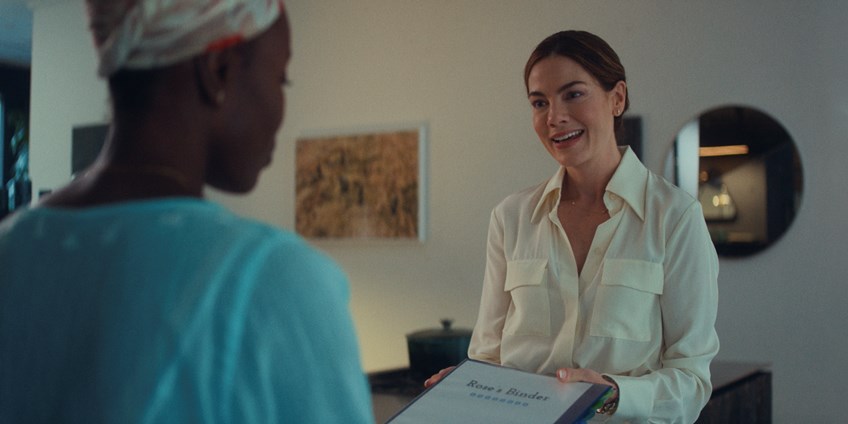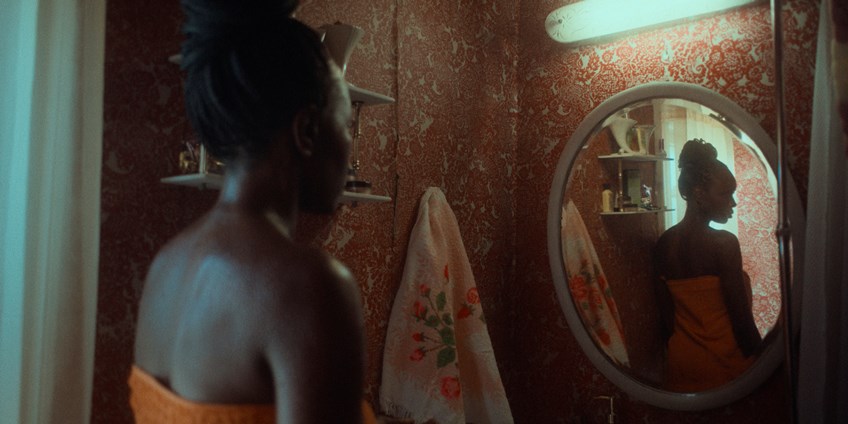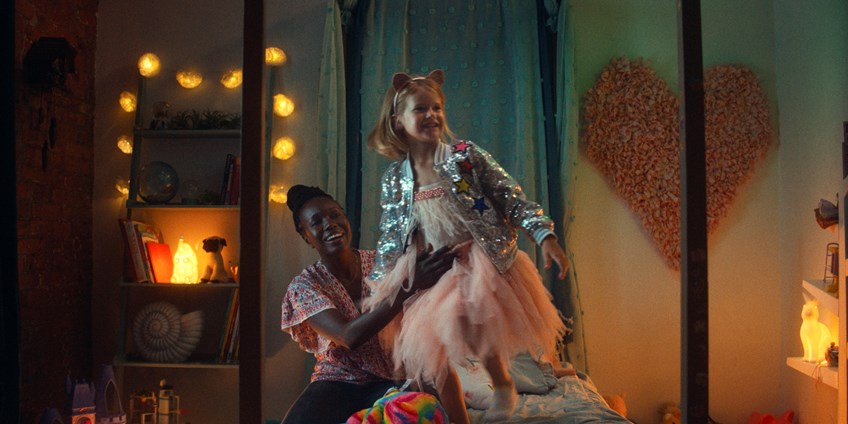Joyce Glasser reviews Nanny (November 25, 2022) cert 15, 97 mins.
If movies about nannies and child minders account for a fair percentage of thrillers, psychological horror and horror movies, you can understand why. Most people in the western world, at least, have either had a nanny or babysitter, hired one, or have been one. And if parents have qualms about leaving their vulnerable darlings with a stranger, nannies worry about the opportunities for abuse – from parents and children alike. You don’t have to go as far back as Bette Davis in The Nanny or Robin Williams in Mrs Doubtfire to know that the genre is flexible and open to social commentary. In 2022, however, along with socio-economic imbalances between employer and employee, it is even more interesting to see a female writer-director adding a racial dimension to the genre.
That the set-up is familiar works for writer-director Nikyatu Jusu, born in Georgia USA (to Sierra Leonian parents) because she can then go about subverting the norm in subtle and less subtle ways. Strikingly attractive, tall, personable and outwardly confident, Aisha (Anna Diop, Us,Titans) presents herself to the Black doorman (Sinqua Walls) in the upper East Side apartment building where she has been accepted for a new job.
Aisha is not the first hard-working woman in New York who cares for a middle-class family’s child in order to save up to bring her own son to the United Sates. This goal is best left out of the job interview, however, Aisha’s daily anxieties about her adorable son Lamine (Jahleel Kamara), left in Senegal in the care of Aunty Mariatou (Olamide Candide-Johnson), are internalised in the form of visions and nightmares seeped in African magic and folklore.

Amy (Michelle Monaghan) is an attractive, well-dressed working mother with a well-rehearsed and no doubt well meaning welcome act. It is belied by a ring-binder with typed up rules, a kind of contract that Aisha cheerfully commits to memory but which Amy, when it comes to paying overtime or for sleepovers, pretends to forget.
If you anticipate that a bratty, only child will upset the apple cart and accuse Aisha of all sorts of lies to get her sacked, you are in the wrong nanny movie. Rose (Rose Decker) is a sweetie who instantly bonds with her new nanny. Rose makes Aisha look all the better by quickly learning French, doting on Aisha’s every word.
‘Make yourself at home and bring in anything you want,’ Amy tells Aisha as she shows her the bedroom she’ll occupy if it’s necessary to sleep over. But Rose is super sensitive to smells… Just what foul odours and spicy African foods Amy has in mind are not listed along with the emergency phone numbers.
Rose, Amy explains, is a fussy eater, in part because of all sorts of allergies and her restrictive diet is high in organic rabbit food. Aisha notices however that Rose’s adulation is not restricted to her nanny’s exotic looks or fluent French. She wants to eat what Aisha is eating. Aisha tries to enforce Amy’s rules, but defeated, gives Rose a taste of her spicy lunch. Instantly Rose is happily eating everything in front of her, with no side effects.
At the end of every day Aisha makes the long commute back to her room where she calls Senegal to hear about or speak to Lamine.
But her nights are troubled with visions of a mermaid dragging her down in the pool where Rose has her swimming lessons, and a big black spider crawling down her face into her mouth. This is Anansi a spider from the famous West African Ashanti tale. In the folk tale, he’s a mischievous rogue, but a wise, loveable one, who sets out on a long, difficult journey, a bit like Aisha’s – or Lamine’s.

On hand as Aisha’s spiritual guide is the mother of Aisha’s new boyfriend (Zephani Idoko), a supportive rock whom she meets by pure chance, but is not particularly central to the story. The mermaid Aisha learns is Mami Wata a water spirit with dark motives. If Aisha hoped to leave all this behind when she landed in the promise land, she is mistaken as the startling ending reveals.
These visions might distinguish Aisha from other nannies, but they bother Aisha a lot more than they do the audience. They are not integrated into the story in the same way as the bombing of a lone mother’s apartment in the Iran-Iraq war was intrinsic to the supernatural horror in Under the Shadow (2016), another feminist horror movie.
Dreams are not as frightening as reality. It is Aisha’s interaction with Amy and her photo-journalist husband Adam (Morgan Spector), where the real tension lies, and their scenes together are darker than any spider. Politely and demurely at first, and then firmly, Aisha demands her full salary, paid on time.
Aisha gradually learns that the marriage is rocky and that Amy, the recently promoted breadwinner, is struggling to keep up with the old boy’s culture at work. She comes home inebriated from a night out with the clients where she competes with her male colleagues. Jusu brings in a new dimension with this dynamic, observing that Amy is too wrapped up with her own work-life balance issues to reflect on Aisha’s. Aisha and Jusu could help one another, but there’s no solidarity amongst women here where the women are so unequal.
When Aisha meets Adam, she appeals to him for the money, and he plays good cop to his wife’s bad cop. But in one scene where Adam makes a pass at Aisha and uses the term “advance” to describe the back pay owed her, Aisha realises she will never be accepted on equal terms no matter how professionally she carries out her job.
A happy ending in the form of a coda seems tacked on, but, given the darkness of the bombshell thrown at us in penultimate scene, many may welcome it. All in all an impressive feature debut from a writer-director who has worked her way up the ladder with six short films behind her.




